Natalia Grossman continued her reign as the queen of Salt Lake City with her 10th World Cup gold medal. She has won all six Boulder World Cups hosted in Salt Lake City, including beating Janja Garnbret in 2021.
Sorato Anraku won his second gold medal and first as the favourite. The emotions poured out as he celebrated his win at the top of the final boulder as he won ahead of Meichi Narasaki and Jakob Schubert.
The whole competition was extremely entertaining, with dynamic, modern, powerful and creative routesetting, allowing the climbers to express themselves and find different solutions to the problems across the rounds.
What You Need To Know
- Natalia Grossman won her 10th World Cup medal, taking her to one gold medal behind Shauna Coxsey (Great Britain) in the all-time list of World Cup medalists. Oriane Bertone won her 6th silver medal, and Naïlé Meignan won her first bronze on her return to competition climbing after recovering from a terrible knee injury.
- Sorato Anraku won his second World Cup gold medal and first as the favourite after a stand-out year last year when he won the Boulder World Cup series. Meichi Narasaki’s flash of the third slab boulder meant he finished second, and Jakob Schubert won the bronze medal, his 11th Boulder World Cup medal, thanks to a buzzer-beater on the first boulder.
- Grossman’s win moves her to be equal to Janja Garnbret at the top of the Series ranking. Oceana Mackenzie’s fourth place in Salt Lake City moves her up to third.
- Anraku’s win moves him to the top of the Series ranking ahead of Tomoa Narasaki. Meichi Narasaki’s silver medal moved him to third in the Series, just behind his brother.
- Alex Honold was delightful as a first-time commentator, asking the questions many of us had and sprinkling in some dry wit. He will be commentating on climbing at the Olympics.
- There were few injuries during the event. Grossman and Jan-Luca Posch both injured their knees, and Colin Duffy rolled his ankle in the male semi-final. Both Grossman and Duffy have a chance to rest up before the Innsbruck World Cup, while Posch is registered to compete at the Shanghai OQS event next week.
- You can find replays on the Olympic Channel, the IFSC YouTube Channel (geo-restrictions apply) and Eurosport.
- Full results from the IFSC.
Natalia Grossman dominates despite knee troubles
Natalia Grossman is the dominant boulderer of this era, and on home turf, you should not bet against her. Her win in Salt Lake City continues her streak with six wins out of six at her home World Cup.
But it wasn’t without its challenges.
On the first boulder in the semi-final round, an “electric” stop-start coordination boulder with athletes travelling across three panels of wall, she injured her right knee. She would finish the round, topping every boulder, including getting the only top of Boulder 3 and the third top of Boulder 2.
Between the semi-final and final rounds, Grossman got her knee checked out, and there wasn’t anything torn or damaged, “Just some pops”, she commented after the competition. She said that she wanted to look at the final boulders before deciding on whether she would compete or not.
The first boulder in the finals was straightforward, and every athlete topped it. Although Grossman flashed it, she landed on her left leg before rolling back, reducing the stress on her right knee.
The second boulder was a long, complex coordination boulder with athletes travelling across three panels for a wall. She commented, “That second climb in the final, I’ve been working on coordination so much these past few months, and to have it pay off in the semi-final and the final. I’ve never screamed or anything, but I was pretty psyched.”
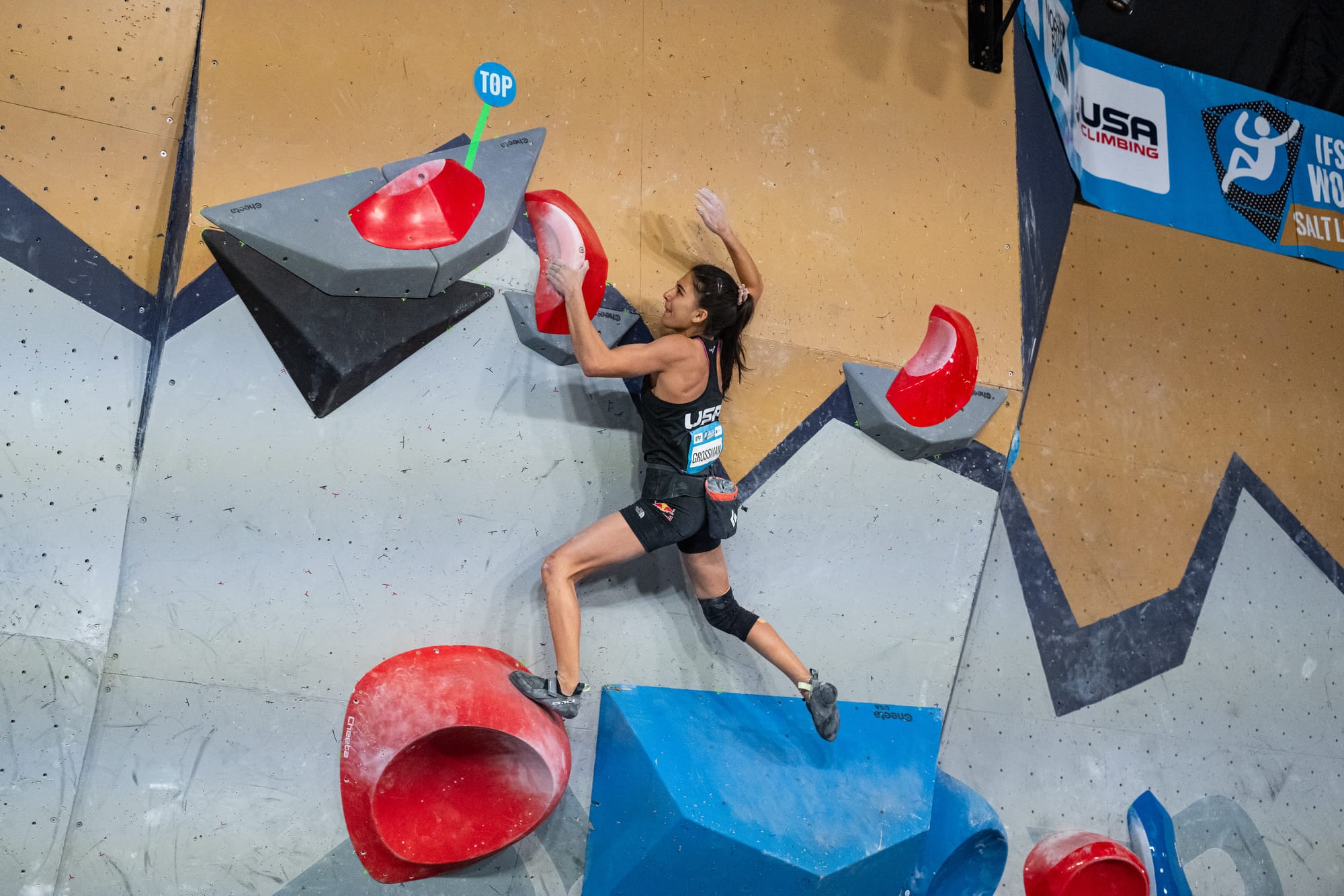
The fourth boulder was the one that looked the worst for her knee. It featured a precision jump with the right foot, a move that would have been at home in parkour, to a small hold on a no-textured volume before reaching over to the zone. The move looked to many spectators like one, which could have prevented Grossman from competing in the final. “The last boulder was the least friendly thing I could think of,” she said afterwards. “But with the adrenaline, I didn’t feel it too much. Tomorrow, that will be different.”
She only needed to reach the zone to win the round, not that she knew it. It took her 7 attempts to reach the zone, but she still had 1 minute 45 left to work out the final section. She was not able to top the boulder, finishing unsure of whether she’d won or not as she walked off the mats without her trademark smile. Grossman is greeted by Brooke Raboutou and Oriane Bertone, and you can see when she realises she’s won as that smile breaks out.
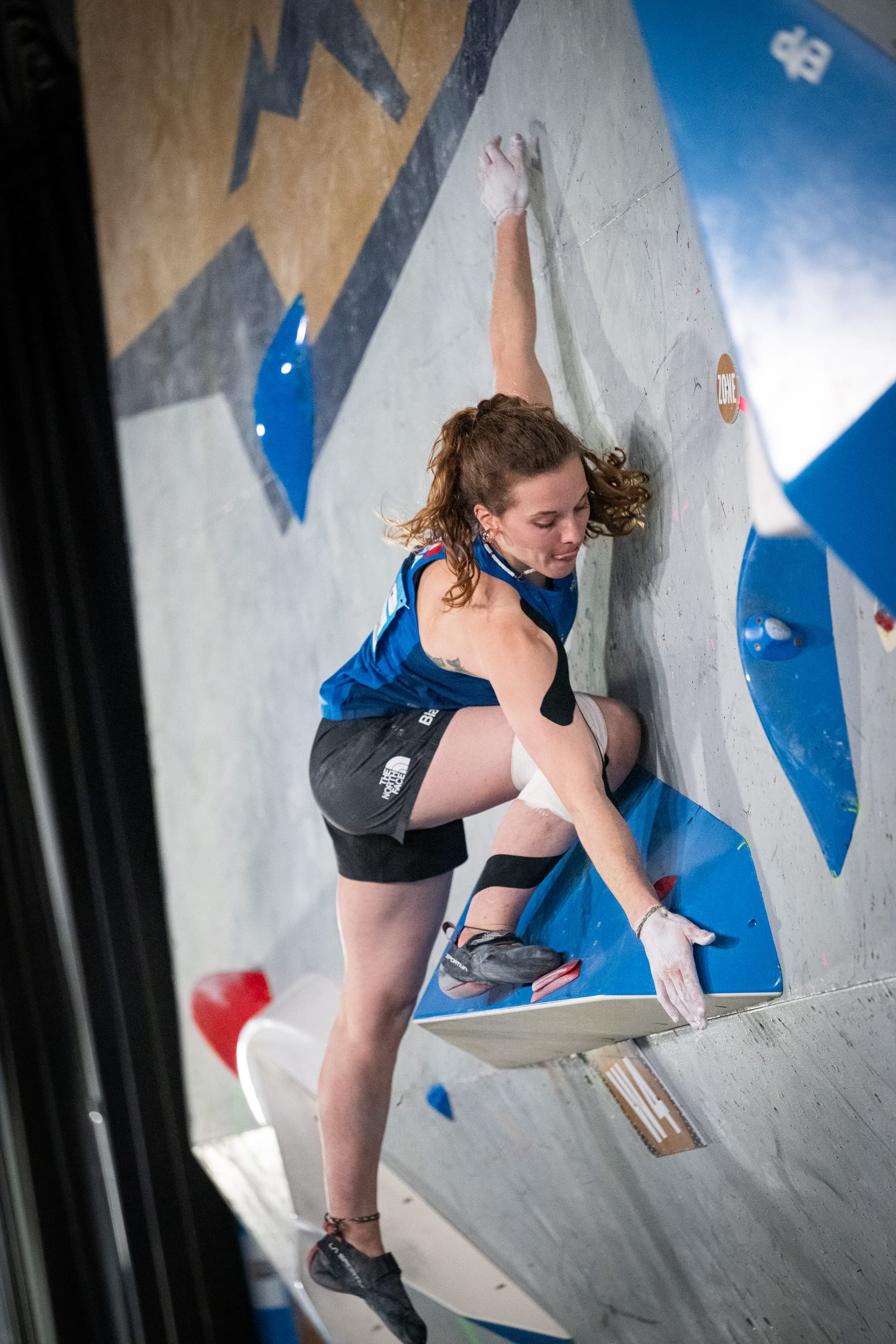
The World Cup circuit now breaks for two months for the Olympic Qualifier events in Shanghai and Budapest. The next World Cup is the Boulder and Lead World Cup in Innsbruck, which will start on June 26th, giving Grossman 2 months to rehab her knee before her next competition and 3 months before the Olympics.
Sorato Anraku’s first Boulder World Cup win as a favourite
You could not have asked for much more from Sorato Anraku last season. He won both Lead and Boulder World Cups, both the Lead and Boulder World Cup Series and qualified for the Olympics. He is a favourite for an Olympic medal, if not the gold medal. Like Janja Garnbret, Sorato Anraku now carries the title of favourite for any event he enters.
Anraku’s win in Salt Lake City this year was his first win as a favourite after winning his first World Cup in Innsbruck last year. Although the field was reduced because of the Shanghai OQS event next week, he still had to beat fellow Olympians and World Cup gold medalists Tomoa Narasaki, Toby Roberts, a resurgent Jakob Schubert, and the rest of Team Japan, who do not have the Olympics to peak for.
Like Janja Garnbret, Sorato Anraku now carries the title of favourite for any event he enters.
Anraku’s win was built on topping both of the two easier boulders, boulders 1 and 3, which no one else managed. The first was an electric coordination boulder, and the third was a balance slab. Anraku, along with nearly everyone else, skipped the 180 spin move on Boulder 3, instead opting for a precision jump across the slab. Only Meichi Narasaki would execute the spin on his way to flashing the boulder.
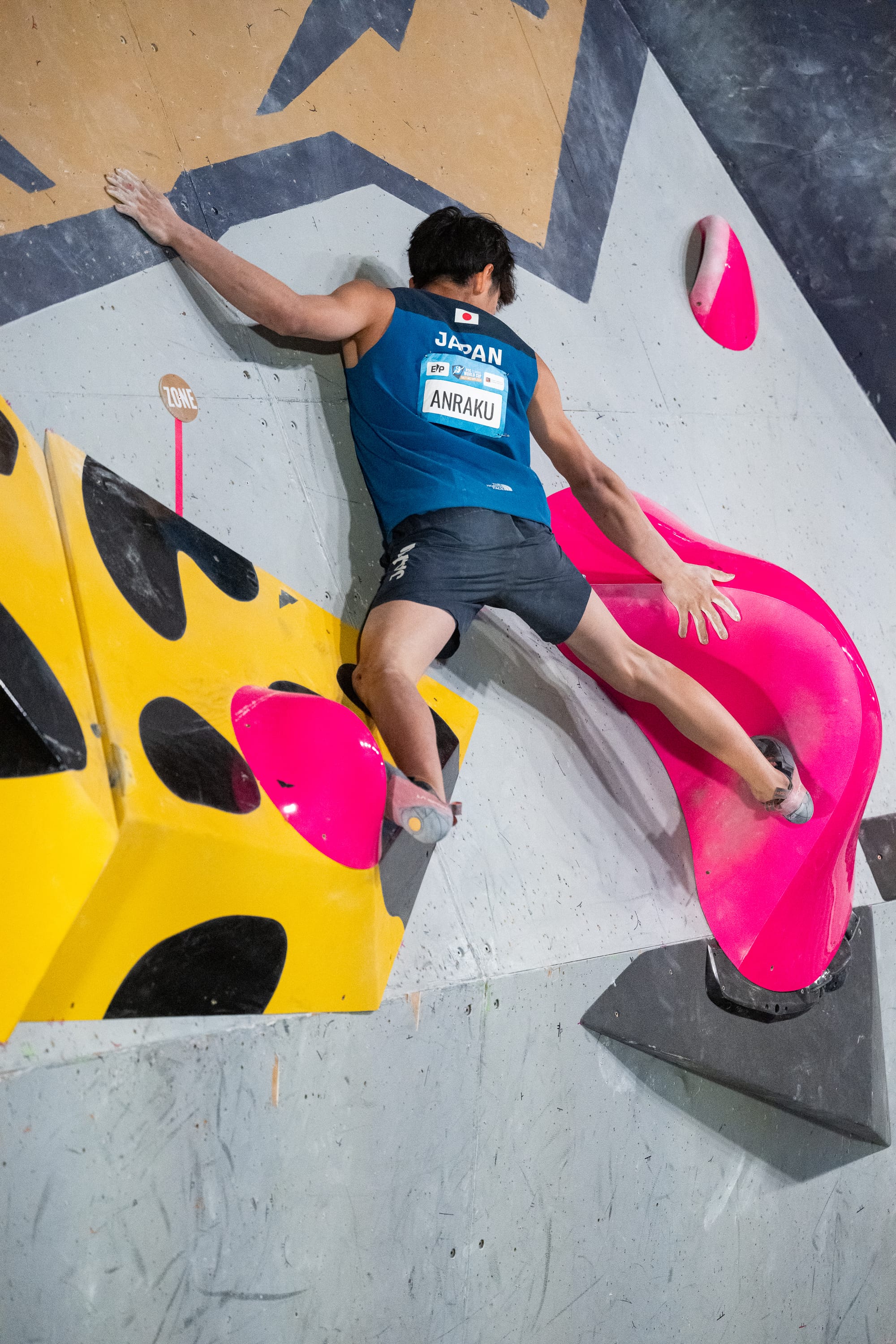
On the final boulder, Anraku would be the only one to top it, stopping on the no-texture handhold before the zone, and was the only athlete to use it to reach the top. When he matched the top, he paused. You could see what it meant to him.
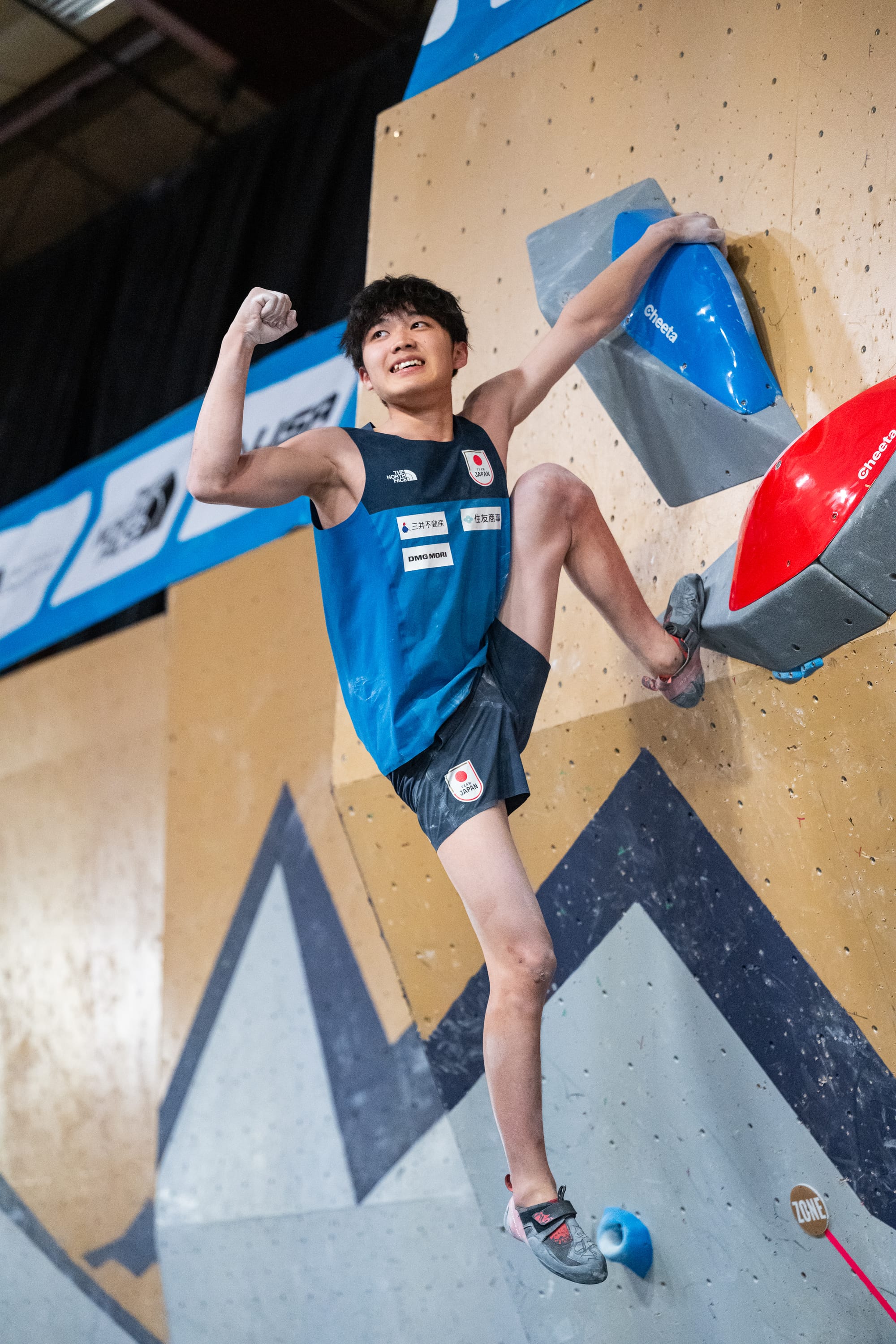
Naïlé Meignan returns to the international competition circuit with a bang
Before the Salt Lake City World Cup, most non-French climbing competition viewers would not have heard of Naïlé Meignan. But now we all definitely have.
Meignan progressed as a youth athlete to finishing second in the French National Championship and finishing 18th at her first-ever World Cup in Wujiang, China, in 2019, only aged 16. She then took a break for a year after feeling burned out. That year coincided with the COVID-19 pandemic starting in early 2020 and the tragic death of her friend Luce Douady in June 2020. On her return to competitions in 2021, she won the Junior Boulder World Championship – the title Douady had won back in 2019.
Then, in December 2021, while descending a boulder and trying not to fall on another climber, she broke her ACL and tore her meniscus in her knee. After two operations and 2 years of rehab sessions, she returned, for the second time, to competitions this year. In February, she came third at the France National Bouldering Championship behind Oriane Bertone and Zelia Avezou. Now, she has won a bronze medal at her second Boulder World Cup.
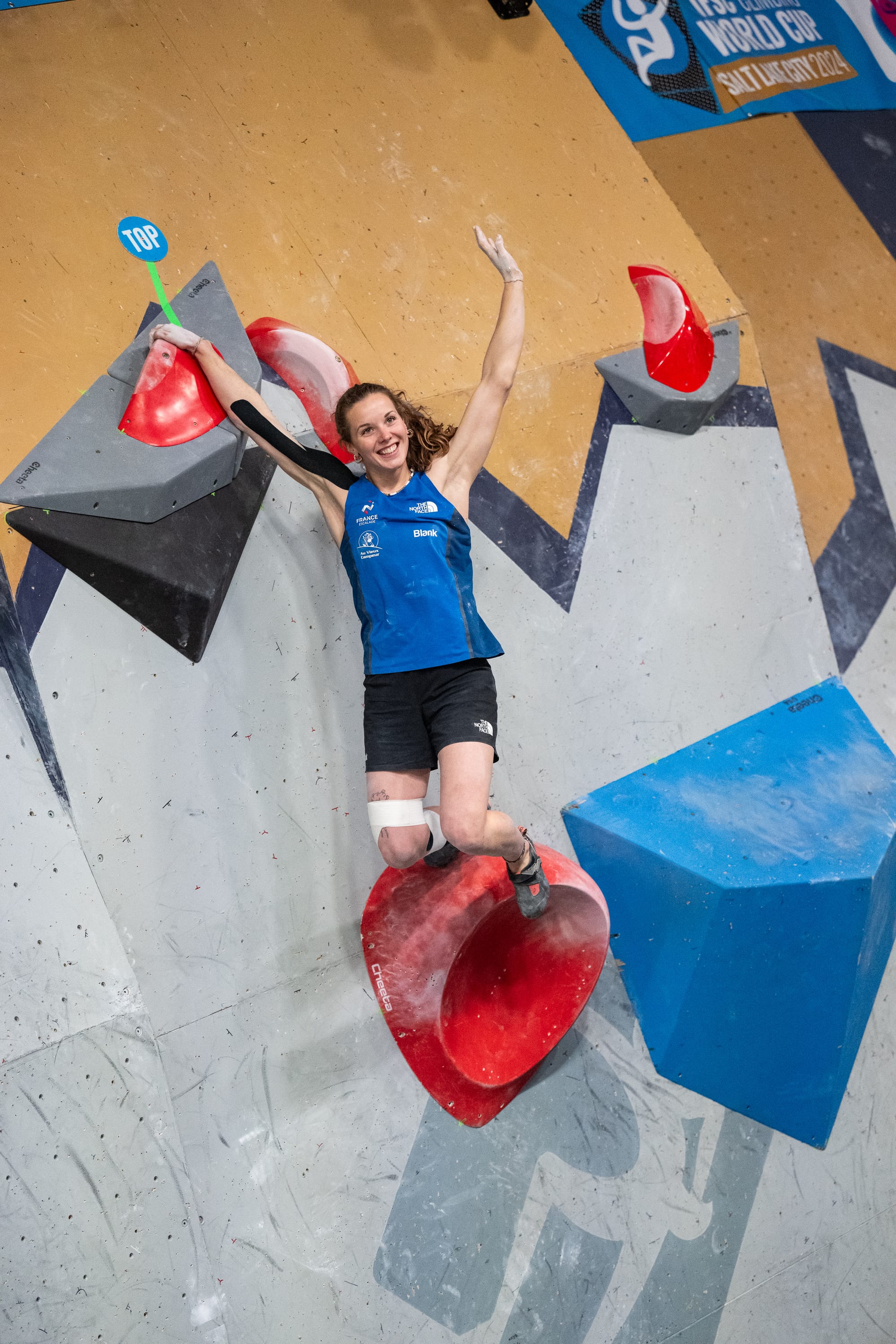
On Instagram after the competition, she wrote
5 years ago you [Luce Douady] did your first final here, and last Sunday you were watching over me, for my first final here too. my eyes watering on the podium, I thought about you, you were here, just here, alongside me.
i honestly don’t have any words, the pictures talk for themselves.
i’ve rarely felt so in tune with my climbing.
i was simply happy to be there and to enjoy every single moment
Dynamic Route setting with climbers using different beta
The routesetting through the competition was dynamic, modern and extremely enjoyable to watch. Manuel Hassler, co-owner of Flathold, was the head setter, and Pierre Broyer (France), Anna Borella (Italy) were the other official IFSC setters. The competition had a similar feeling to old competitions in Meiringen, with a smaller crowd (around 1,000 people) in a compact indoor venue with interesting and complex routesetting.
We saw some of the Flathold no-tex holds developed in collaboration with Broyer for the 2023 World Championship, as well as many Cheeta and Flathold macros, just like in Meiringen.
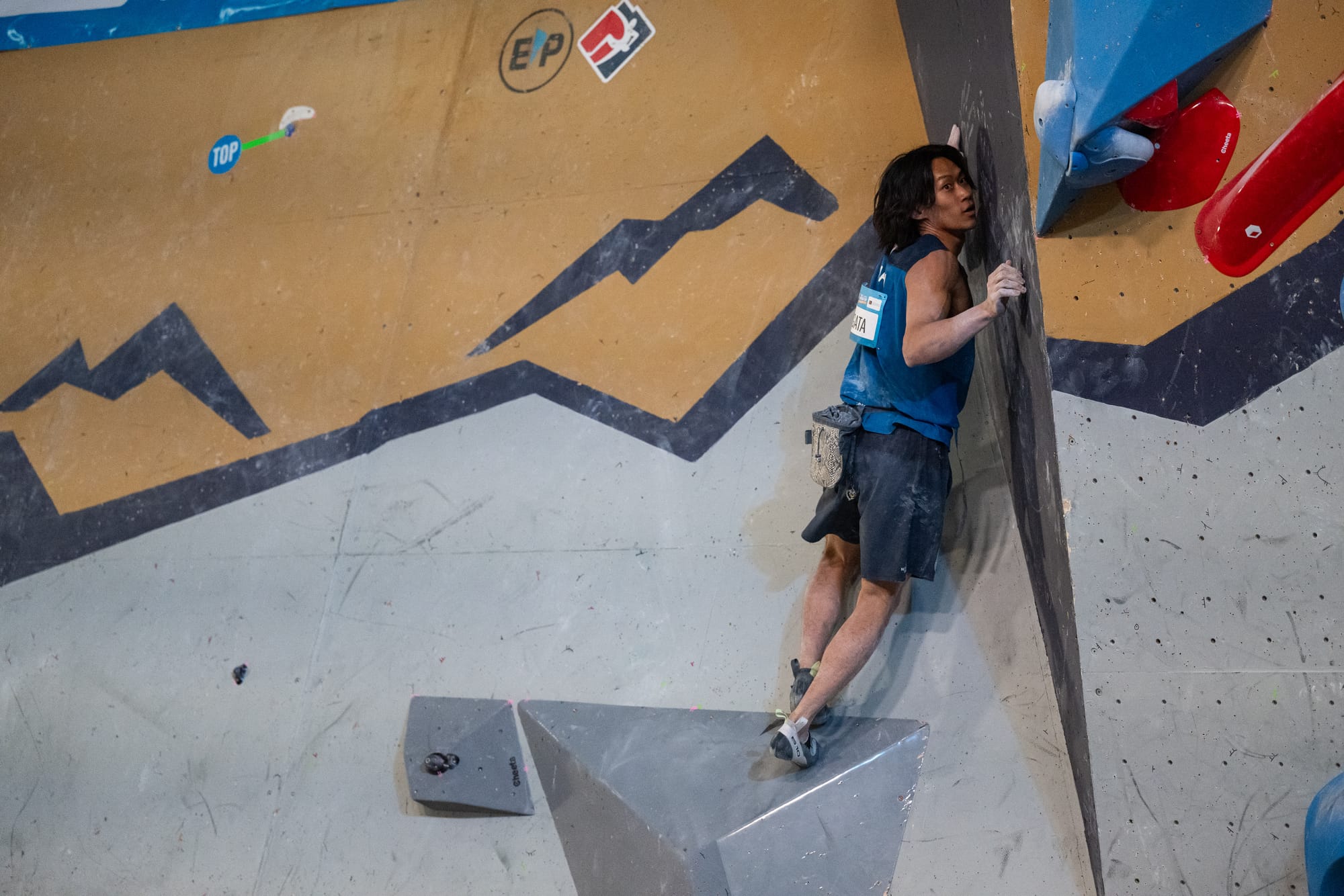
The setting allowed climbers to express themselves, from Yoshiyuki Ogata tick-toking on Boulder 4 to Yannich Flohé and Jakob Schubert crushing Boulder 3 in the Men’s semi-final.
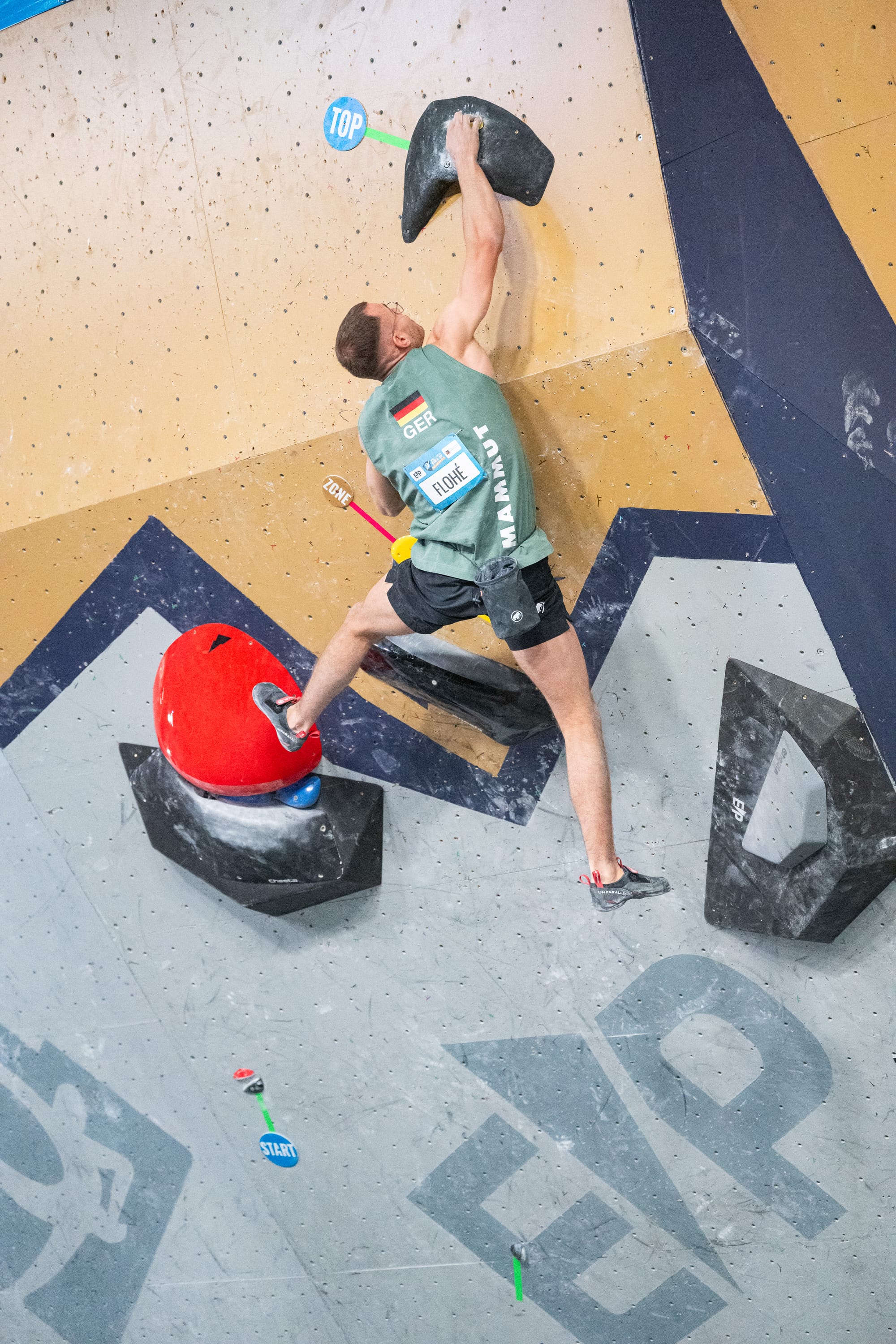
The female athletes also had a variety of boulders to express themselves, including powerful boulders on the steepest section, including the semi-final second and third boulders. Only Brooke Raboutou, Natalia Grossman and Mao Nakamura topped the second, and only Grossman topped the third. They also had top navigate the long coordination boulders that featured near the two ends of the wall.
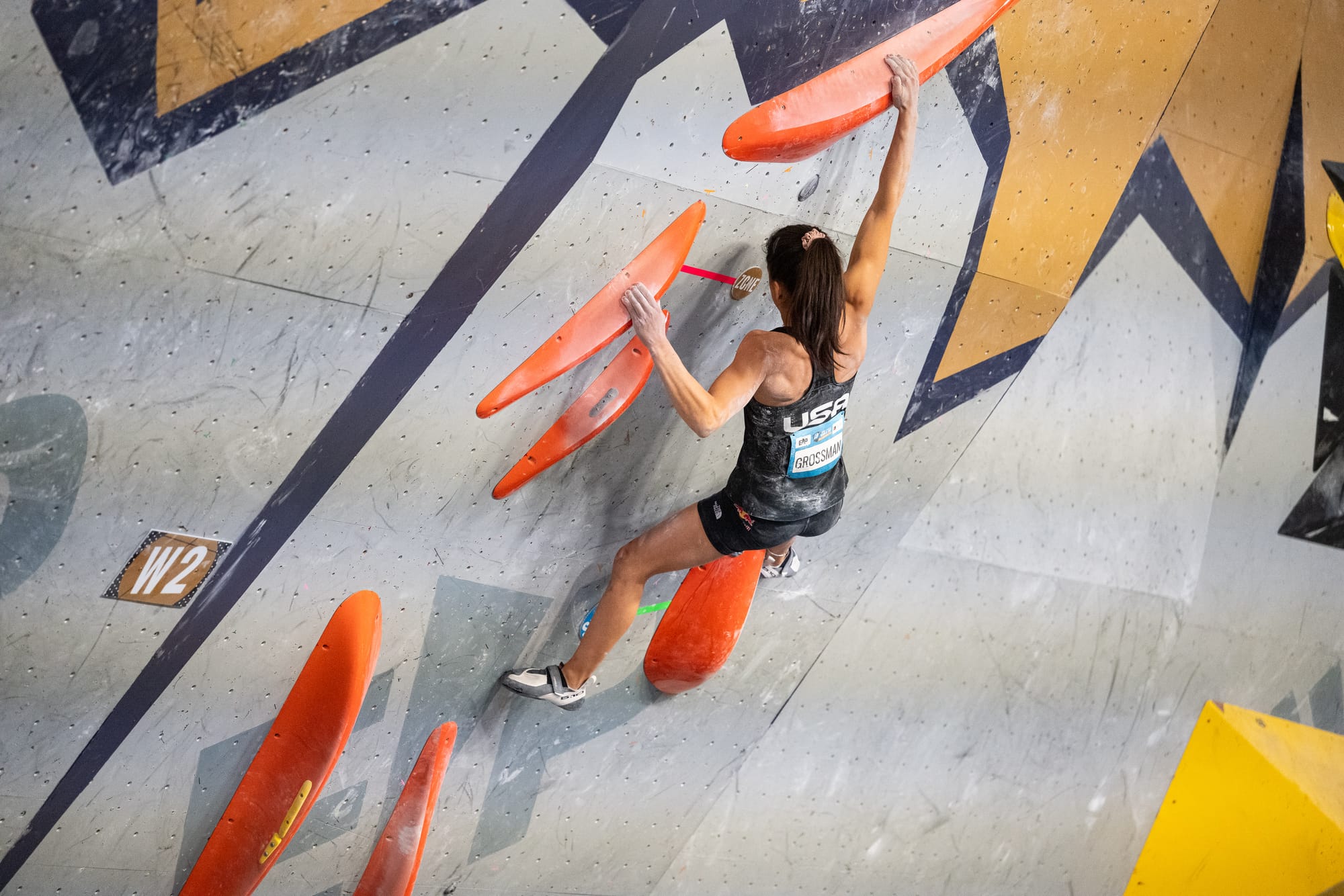
Overall World Cup Series
| # | Athlete | Keqiao | SLC | Innsbruck | Prague | Seoul | Total Points |
|---|---|---|---|---|---|---|---|
| 1 | Janja Garnbret | 1 | – | 1000 | |||
| 1 | Natalia Grossman | – | 1 | 1000 | |||
| 3 | Oceana Mackenzie | 10 | 4 | 960 | |||
| 4 | Anon Matsufuji | 6 | 10 | 845 | |||
| 5 | Mao Nakamura | 11 | 6 | 807.5 | |||
| 6 | Camilla Moroni | 2 | – | 805 | |||
| 6 | Oriane Bertone | – | 2 | 805 | |||
| 8 | Zhilu Luo | 3 | – | 690 | |||
| 8 | Naïlé Meignan | – | 3 | 690 | |||
| 10 | Madison Richardson | 7 | 10 | 675 |
Grossman’s win moves her level with Janja Garnbret at the top of the Boulder World Cup Series. Oceana Mackenzie’s fourth place moves her up to third overall. Japanese finalists in Keqiao, Anon Matsufuji, and SLC, Mao Nakamura, move up into 4th and 5th, respectively. Next, joint 6th are the second-place finishers Camilla Moroni and Oriane Bertone. Then the third-place finishers Zhilu Luo and Naïlé Meignan are in joint 8th. Madison Richardson rounds out the top 10.
| # | Athlete | Keqiao | SLC | Innsbruck | Prague | Seoul | Total Points |
|---|---|---|---|---|---|---|---|
| 1 | Sorato Anraku | 2 | 1 | 1805 | |||
| 2 | Tomoa Narasaki | 1 | 9 | 1380 | |||
| 3 | Meichi Narasaki | 6 | 2 | 1300 | |||
| 4 | Jakob Schubert | 8 | 3 | 1105 | |||
| 5 | Toby Roberts | 4 | 7 | 1065 | |||
| 6 | Jan-Luca Posch | 9 | 5 | 896.66 | |||
| 7 | Colin Duffy | 12 | 8 | 715 | |||
| 8 | Hannes Van Duysen | 3 | – | 690 | |||
| 9 | Sohta Amagasa | 29 | 4 | 662 | |||
| 10 | Sam Avezou | 5 | – | 545 |
Anraku’s win moved him into first place in the Boulder World Cup Series, and Tomoa Narasaki’s 9th place finish was enough to remain second. Meichi Narasaki’s second place moves him up to third in the Series. Jakob Schubert’s third place moves him into fourth in the Series, while Toby Roberts drops to fifth. Jan-Luca Posch’s second-ever World Cup final appearance moves him up into 6th, ahead of Colin Duffy in 7th and Hannes Van Duysen in 8th. Sohta Amagasa’s 4th place in SLC moves him up into 9th, while Sam Averzou drops to 10th after not competing.
The next stop on the Series will be in Innsbruck, Austria, where many of the Olympians have said they plan to compete. We are likely to see Grossman, Raboutou, Mackenzie, Bertone and Garnbert at the event, as well as Roberts, Narasaki, Anraku, and Schubert.





